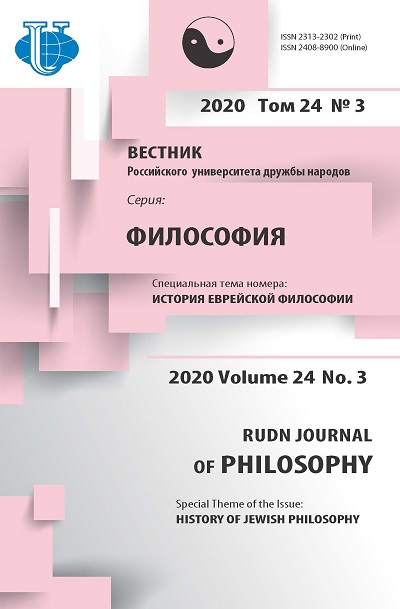Strategies of Time Appropriation: Authentic and Inauthentic Historicity of Man
- Authors: Cherepanova E.S.1
-
Affiliations:
- Ural Federal University
- Issue: Vol 24, No 3 (2020): HISTORY OF JEWISH PHILOSOPHY
- Pages: 419-431
- Section: PHILOSOPHY OF LIFE AND EXISTENTIAL PHILOSOPHY
- URL: https://journals.rudn.ru/philosophy/article/view/24355
- DOI: https://doi.org/10.22363/2313-2302-2020-24-3-419-431
- ID: 24355
Cite item
Full Text
Abstract
The article focuses on those paragraphs of the famous text ‘Spiritual Situation of our Time’ by Karl Jaspers in which he approaches the problem of time from the perspective of philosophical anthropology. This text was published in 1931 and saw multiple editions, including the reprint in 1947, which followed the lecture “The Question of Guilt”. We surmise from this juxtaposition of texts in the new publication that Jaspers believed in the necessity to revisit the problem of the spiritual situation, but he also regarded his conceptualization of temporality viable in the new context and applicable to analyzing this new situation. We corroborate this hypothesis by close reading of the version of the 1947 text. As there exists a wealth of studies of Jaspers’s philosophy, we aim to explicate his interpretation of personal historicity and to find a reply to the question why it seems necessary to emphasize the appropriation of time. We demonstrate that the existentialist approach Jaspers offers is a universal model for living in the spiritual situation and for appropriating time. The need to appropriate time is inherent in human nature but the capacity to make sense of it and unravel the potential for authentic existence is not. Human beings are often unaware of their choice of certain time appropriation; moreover, human beings lack consistency in constructing the context of their own historicity. We elaborate in greater detail on the meaning of such concepts as spiritual situation, knowledge of the totality, philosophical life.
About the authors
Ekaterina S. Cherepanova
Ural Federal University
Author for correspondence.
Email: e.s.cherepanova@urfu.ru
D.Phil., Professor at the Department of History of Philosophy, Philosophical Anthropology, Aesthetics and Theory of Culture
Mira St., 19, Ekaterinburg, Russian Federation, 620002References
- Mironov V, Mironowa D. Ein Knabe, der träumt, or intoxication by power. Logos. 2018; 28 (3): 149—182. doi: 10.22394/0869-5377-2018-3-149-179. (In Russian).
- Meinecke F. Die deutsche Katastrophe: Betrachtungen und Erinnerungen. Wiesbaden: E. Brockhaus; 1946. 177 S.
- Jaspers K. Vopros o vinovnosti. O politicheskoj otvetstvennosti Germanii [The question of German guilt. On Germany's political responsibility]. Moscow: Progress; 1999. 149 p. (In Russian).
- Vlasova OA. Filosofiya e`kzistencii Karla Yaspersa i ee antropologicheskie praktiki [Karl Jaspers' philosophy of existence and its anthropological practices]. Researcher. 2018; 1—2: 73—77. (In Russian).
- Harth D. Die Kritik der existenzphilosophischen Kulturkritik — Karl Jaspers' «Die geistige Situation der Zeit» im Kontext der frühen 30er Jahre. In: Paul, Jean-Marie (Hrsg.): Situation de l'homme et histoire de la philosophie dans l'œuvre de Karl Jaspers: Actes du Colloque Karl Jaspers; 21 et 22 mars 1986. Presses Univ. de Nancy, Nancy; 1986. P. 137—152.
- Stichworte zur geistigen Situation der Zeit: Politik und Kultur. Frankfurt am Main: Suhrkamp, 1979. 860 S.
- Kaube J. Dreimal «Geistige Situation der Zeit»: 1931.1981—2008. In: Wahrheit ist, was uns verbindet. Karl Jaspers. Kunst zu philosophieren. Göttingen: Wallstein Verlag; 2009. S. 379—391.
- Jaspers K. Die geistige Situation der Zeit (1931). Berlin: Walter de Gruyter & Co; 1947. 191 S.
- Jaspers K. Filosofskaya avtobiografiya [Philosophical autobiography]. In: Pertzev AV. Molodoj Yaspers: rozhdenie e`kzistencializma iz peny` psixiatrii [Young Jaspers: the birth of existentialism from the foam of psychiatry]. Saint Petersburg. Izdatel`stvo russkoj xristianskoj gumanitarnoj akademii. Р. 240—393. (In Russian).
- Monk R. Ludwig Wittgenstein. The Duty of Genius. Moskow: Izdatel`skij dom Delo; 2018. 624 p. (In Russian).
Supplementary files















